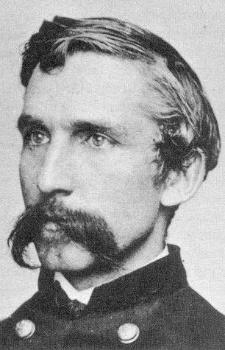

We all know that story of the 20th Maine's defense of Little Round Top on the 2nd of July, 1863. Or do we? What I think we know is the story that the then Colonel and later the three term Governor of the State of Maine would like us to know.
Chamberlain was a preacher's son and did go to seminary school but eventually decided that he had not received the calling. He became before the war a professor at Bowdoin College were he taught Rhetoric, Oratory, and Comparative Religion. Skills that he would use after the war to his advantage.
In 1883 Chamberlain wrote a long article on the Old Testament warrior and his namesake, Joshua. In this article Chamberlain lists ten things that Joshua had that made him a great leader of men; inspiration, resolution, straight forwardness, severity of discipline, justice, sagacity, promptness of action, thoroughness of execution, and balance of character. Traits that I'm sure that Chamberlain saw in himself or at least wished too.
The story of Little Round Top that we all know is the story of how the little 20th Maine Regiment saved the entire Union line and it was all because of the "Hero of Little Round Top". Because that's the story that the hero had told over and over again. Including once while standing at the monument to the 20th Maine on Little Round Top during it's dedication. You can imagine that with his speaking skills he was able to capture an audience and take them with him back to the battle as he saw it.
Major Ellis Speer, Chamberlain's good friend and in command of the left of the line in his writings on battle say's that he was the one that saw the Alabaman's flanking his position and went to Chamberlain with the recommendation that they refuse their left. Meaning that they would turn their line 90 degrees from its original position.
I'm sure that as the ammunition ran out Chamberlain ordered the fixing of bayonets. But was it to sweep the field in their front as he says? Or as a defensive ploy preparing for hand to hand combat? Who is to say now. I've seen it suggested that the charge happened without order, that the men of Company K went over the wall to rescue the wounded and the rest of the regiment charged before an order to do so was given.
Through all the controversy, Chamberlain stuck to his story. How much does this really matter? Joshua L. Chamberlain has become a man that all army officers aspire to be like. And if that is truly his legacy, who am I to blow holes in it?
From his Medal of Honor Citation: "Daring heroism and great tenacity in holding his position on the Little Round Top against repeated assaults, and carrying the advance position on the Great Round Top."
|